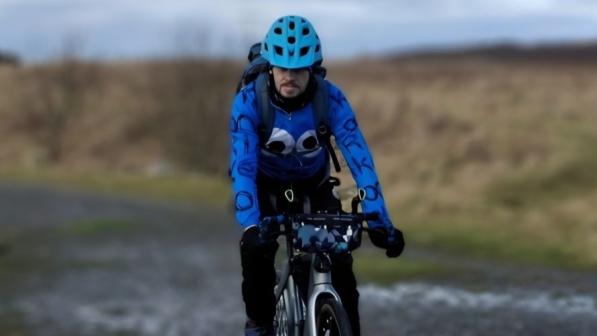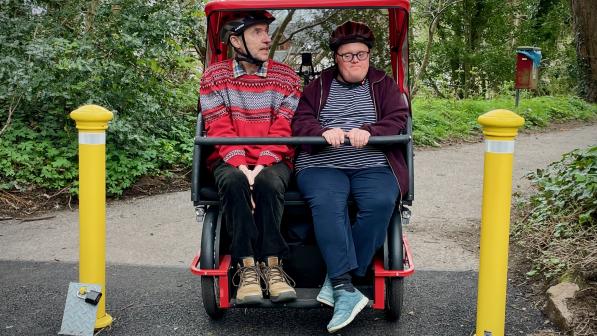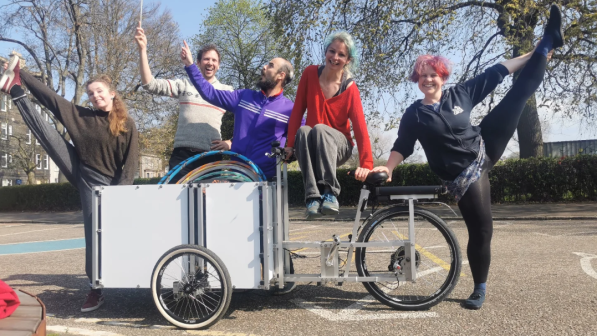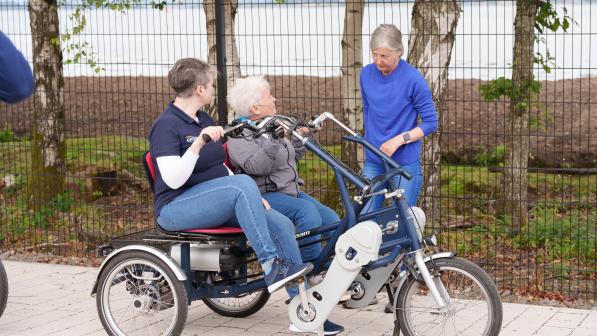The electric bikes that are saving lives in Glasgow

“These bikes save lives”, says Pat Doogan, 62, who, for nearly three years, has worked for the street team of Men Matter Scotland, a men’s wellbeing and suicide prevention charity operating in Drumchapel, Glasgow.
The team has recently acquired five new electric bikes thanks to funding from Cycling UK to scale up their fleet, and they’re set to make a huge difference by helping the charity reach men experiencing a crisis or poor mental health.
While Men Matter Scotland offers ongoing support from their hub, covering everything from personal counselling and various sport activities to food and clothing banks, the street team’s role is different.
They are at the frontline of outreach, regularly responding to emergency calls and doing community rounds and home visits, offering a lifeline to men who are experiencing their darkest moments.
Rapid response vehicles
“We are often the first responders when someone goes missing or there is the possibility of a suicide. These bikes make it safer and faster for us to get to someone,” Pat says.
Before having the e-bikes, the street team would have to walk, use standard bikes or vehicles to conduct searches and outreach. None of these other options are ideal, however.
Walking or riding non-electric bikes is obviously slower and takes a lot of physical effort, especially during searches, which can be lengthy. Cars or vans have other limitations, since you can’t drive them down canal paths or wooded trails – the kind of isolated places that people in a crisis often retreat to.
We can send out two teams of three bikes at any time. A team of three gives better support
Andy MacLister, Men Matter Scotland
Then there’s the small matter of the Scottish weather: e-bikes perform much better against wind and rain when making late-night runs, particularly in the winter.
Funding expansion
The team already had two electric bikes, but there was a need to get more due to how accessible and effective they were. Cycling UK’s Cycle Access Fund provided the funds to expand the fleet, and the extra bikes have completely transformed Men Matter Scotland’s capacity to respond.
“Because we have seven e-bikes now, we can send out two teams of three bikes at any time. A team of three gives better support, more hands to help, and if we need to send for our van to bring someone back, we can still leave two guys [with a person in distress] while one returns to our base,” says Andy MacLister, 37, also working in the street team.
“We also have large pannier bags to carry general supplies and medical aid. With the additional bikes it works really well for a search at night.”
When the team goes out, they usually post about it on Facebook so that followers can aid searches by resharing posts, which helps get the word out about someone needing help.
Talking point
The bright yellow bikes and matching panniers stand out and have become recognisable to locals – also becoming a conversation starter. The group is keenly aware of how they are seen and avoid wearing hi-vis, which in the beginning caused people to mistake them for the police, creating a barrier to approaching people.

That sensitive approach is key to the team’s interventions, as was recently demonstrated to Cycling UK’s Development Officer, Gordon Webber. “Andy and Pat took me along the streets and paths they usually follow on their Friday night rounds. As we were cycling along a canal path, Pat sensed something wasn’t right after passing a gentleman on the canal path.”
It was at that point, the three of them stopped for a moment to chat, and waited until the man caught up with them.
Pat and Andy asked how he was doing to start a conversation, which quickly centred on the bright coloured bikes. But it also turned out that the man, who had been drinking, had had a recent battle with cancer, leaving him unable to work and compromising his mental health.
Because the conversation started naturally, it led to exchanging contact details and the team invited the man to call or visit the hub whenever he needed support. “It was a casual approach to engage someone rather than zero in on him,” Gordon explains.
“You get a sense for things like that,” Pat says. “The more you do this, you start recognising where someone might need our help. If nothing else, it’s a quick acknowledgement of someone and we’re on our way again.”
Personal experience
Andy and Pat both know what they’re dealing with, too. “Most of us have been through this ourselves. Our personal experience with suicide, addiction or mental health gives us the tools to help others,” Andy explains.
Our personal experience with suicide, addiction or mental health gives us the tools to help others
Andy MacLister, Men Matter Scotland
A lot of the people working at Men Matter Scotland, creating a safe environment for men to make connections and talk about their struggles, have struggled themselves, or witnessed the poor mental health of friends or relatives.
Men Matter Scotland are well known and respected in their community, but Pat and Andy say they also benefit from getting out on the bikes from a physical and mental health point of view.
“It makes our job easier, and there is a growing interest for other staff and volunteers to join the team. Having the e-bikes also makes it more accessible so people with varied abilities can take part,” Pat adds.
The yellow e-bikes have made cycling more visible in their community and they’ve also seen interest in cycling grow more generally with participants. Men Matter have a store of old bikes, which they’re now looking to get repaired, so that they can start taking their men out for rides, just for the sake of riding.
Research shows that cycling is a great mood booster and relieves stress too. Both being outside and the endorphins released during exercise make you feel better; studies have shown that levels of depression among cyclists were 25% lower compared to an inactive group. Group riding helps build connections and can reduce isolation.
Pat and Andy also have tips for local decision-makers for what would make cycling better in their area of Glasgow, helping boost their work in the street team. More drop kerbs, more cycle paths, and better lighting along those crucial canal paths would be a great help – because for Men Matter, every ride is a ride to save a life.
Thanks to the continued support of SPT, the Cycle Access Fund is able to keep moving forward and connecting more people through cycling.



